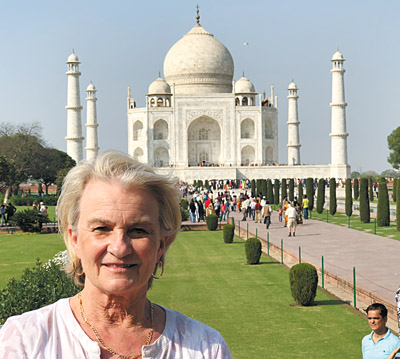Camp reaches out in India
 One of the sights Chris Camp, Rotary Club of Farragut president, visited during her recent Rotary National Immunization Day trip to India, was the Taj Mahal in Agra. Taj Mahal, commissioned in 1632 by the Mughal emperor Shah Jahan, is a mausoleum built on the south bank of the Yamuna River to house the emperor’s favorite wife, Mumtaz Mahal.
One of the sights Chris Camp, Rotary Club of Farragut president, visited during her recent Rotary National Immunization Day trip to India, was the Taj Mahal in Agra. Taj Mahal, commissioned in 1632 by the Mughal emperor Shah Jahan, is a mausoleum built on the south bank of the Yamuna River to house the emperor’s favorite wife, Mumtaz Mahal.
“In early March, I went on an incredible 10-day tour of the Golden Triangle of India, the cities of Delhi, Agra and Jaipur, with 30 fellow Rotarians from the [United States] Canada and Australia — but the only one from Farragut,” Camp said.
While there, her group visited India’s sites — but most importantly, she said, “We had the opportunity to participate in India’s National Polio Immunization Day,” a Rotary project for which Camp joined other U.S. Rotarians in giving the vaccines.
“The hard work [of] organizing, coordinating and implementing the program is done by the Indian health workers,” she said.
“What a feeling to know you are helping to protect these children and rid the world of this devastating disease,” Camp added.
Looking at the children receiving polio vaccines, she observed, “how happy and friendly they were.
“They were very curious and wanted to get close to us and loved having their pictures taken,” Camp added. “We picked up quite a group of children who followed us as we made our way through the neighborhood.
“The older girls were a little shy, as were the mothers, but all were cooperative and grateful to have their children immunized.”
For the last 30 years, Camp said one of Rotary International’s primary goals has been the eradication of polio.
“Although there were less than 30 new cases of polio worldwide last year that were confined to Pakistan and Afghanistan, immunization of young children in India must continue since they share borders with both countries,” she said. “We accompanied Indian health workers through slum neighborhoods to administer two drops of polio vaccine to the children 5 and under.”
Currently, Camp said there are no cases of polio in India.
“The last case in India was reported in 2011, and India was declared polio free in 2014,” she said. “The point of the India NID is to ensure that India stays polio free since it neighbors two countries that are not quite polio free.”
This was Camp’s first Rotary trip overseas, for which she paid all her own expenses.
She departed for India March 2 and returned March 13 and said she took the trip “to participate in the NID event, combined with the opportunity to visit part of India with such a great tour company.”
Travel was arranged through Howard Tours in Oakland, California.
“The owner and our tour guide are Rotarians,” she said.
Another aspect of the trip was sight-seeing.
“We visited some of India’s most extraordinary sights, including the Taj Mahal and the amazing Amber Fort built in 1592 — to which we were transported by elephants,” she said. “We also met with four local Indian Rotary clubs and visited some of their service projects.”
Camp said she returned home with very positive feelings about India and its people.
“We spent a lot of time in Delhi — a huge city of 22 million (people), which is vibrant, colorful and noisy but very positive,” she said.
“Around tourist sights, we were besieged by people selling souvenirs or begging that we had to ignore or be swamped.”
However, she said, “Rotarians we met were unbelievably welcoming and very gracious and generous hosts.
“People in hotels, restaurants and stores were friendly and helpful, and most spoke English,” Camp said. “Even in the poorest parts of town, people were friendly and enjoyed waving back and forth.”


